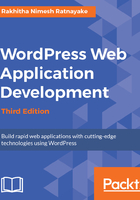
上QQ阅读APP看书,第一时间看更新
Other tables
I have categorized the remaining four tables together in this section as they play a less important role, or act independently in web applications:
- wp_comments: This table contains the user feedback for posts and pages. Comment-specific details such as author, e-mail, content, and status are saved in this table.
- wp_commentmeta: This table contains additional details about each comment. By default, this table will not contain much data as we are not associating advanced comment types in typical situations.
The following screen previews the relationship between comment-related tables:

The tables shown in the diagram are as follows:
- wp_links: This table contains the necessary internal or external links. This feature is rarely used in content management systems.
- wp_options: This table acts as the one and only independent table in the database. In general, it is used to save application-specific settings that don't often change.
You can take a look at WordPress' complete entity relationship diagram at https://codex.wordpress.org/images/9/97/WP3.8-ERD.png
Now you should have a clear idea of the role of existing tables and the reasons for their existence from a CMS perspective. Most importantly, our goal is to figure out how these tables work in advanced web applications, and the next section will focus solely on the web application perspective.